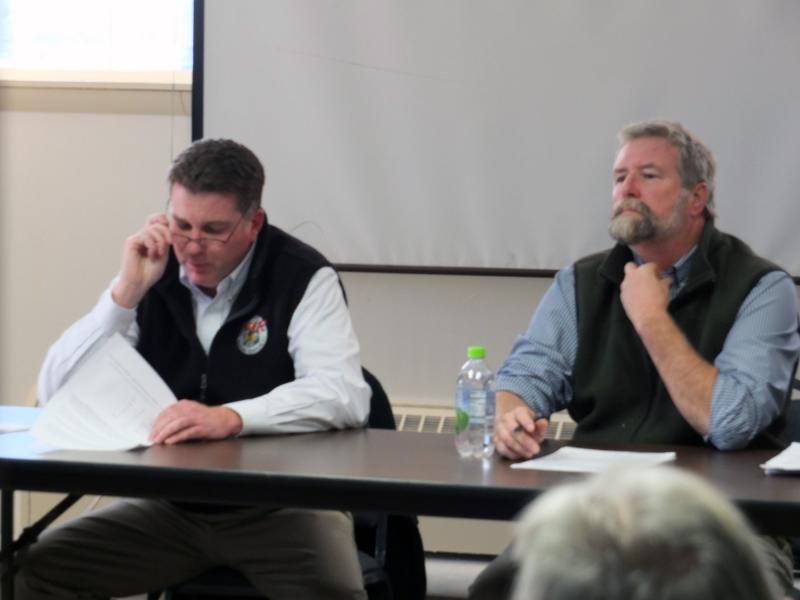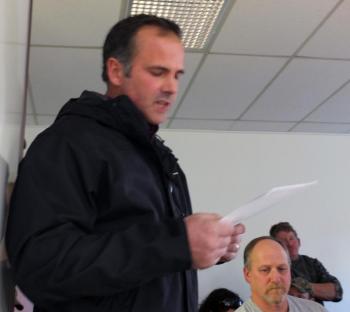Fishermen weigh in on shrimp regulations

The total shrimp tonnage Maine fishermen will be able to haul up and the length of this year's season hangs on what the regulatory body that oversees the fishery decides early next month. Fishermen are concerned they will not be able to turn a profit with a short season and a significant reduction in what they will be allowed to catch.
Records of overfishing threaten the existence of the fishery in Maine and its end could mean consumers purchasing their shrimp from Canada.
From Port Clyde to Portland, they gathered for a special meeting at the Natural Resource Service Center in Hallowell with Department of Marine Resources (DMR) staff on November 26 to discuss upcoming decisions by a governing body of the Atlantic States Marine Fisheries Commission (ASMFC).The Commission's Northern Shrimp Section decides the Total Allowable Catch (TAC) and the season dates each year, based on scientific conclusions. Some fishermen questioned the accuracy of these findings at the meeting, where DMR Commissioner Patrick Keliher had asked for feedback and to develop some consensus on the issue.
He and others will attend a meeting of the fishery's Advisory Panel, followed by a Section meeting in Portland December 3 at which members from the three states of Maine, Massachusetts and New Hampshire will decide the rules for the 2012-2013 shrimp fishing season.
The Section this month approved changes to the interstate management plan for the fishery that allocates 13 percent of the total catch to those who trap shrimp, and 87 percent to those who trawl. According to a November 15 press release, changes in the plan also allows the transfer of unused catch between gear types, sets aside a portion of the catch for research purposes and gives trawlers the option to use a “size sorting grate system … to minimize the retention of small shrimp.”
Steve Peaslee, who has been hauling a couple hundred shrimp traps out of Sheepscot Bay for the past three years, said he is not sure what to expect for this year's season, but is certain the allowable catch is going to be lower.
“It's still kind of up in the air,” he said. “Last year was a hard season.”
Trap fishermen had just 17 days last season. Between setting up, locating the fishing grounds and the weather, this left trap fishermen with about six real productive days of hauling, Peaslee said.
Peaslee is the treasurer of the Maine Shrimp Trapper's Association. Even though he has been trapping shrimp for just the past three years, he draws on a life-long commercial fishing experience and from having attended numerous meetings about this fishery in past years.
How well the trappers will do depends on the length of the season and the weather. The percentage they are allowed is unfair, he said, but believes a later start to this year's season would help everyone. Due to warmer water temperatures, shrimp numbers did not climb until late, according to Peaslee.
“There are a lot of variables,” he said. “You can't forecast it.”
The percentage allocated to trap fishermen is linked to what they caught in years previous. Peaslee said that for the past two seasons they have not been able to haul up all of their catch because the TAC got caught before they had a fair chance.
Those who trawl (drag) for shrimp say they don't want to lose the percentage they have been allocated and to go out for a limited catch, such as 1000 pounds per day, does not make financial sense.
“I've got nothing against draggers,” Peaslee said. “But if we could start the season a little later, I think it would be better for everybody.”
Tim Simmons, President of the Maine Shrimp Trappers Association, spoke up at Monday night's meeting, asking for trappers and trawlers to work together to save the industry. He favors a February 1 start date to the season.
While some fishermen who operate trawlers wanted to start earlier, others agreed that starting on February 1 would work for them. Some fishermen also seemed to reach consensus on another issue: that Maine should manage its own fishery.
However, David Osier who runs Osier's Wharf in South Bristol disagreed. “The shrimp may be in the gulf of Maine, but Maine doesn't own the shrimp. We have three states that have a right to the them,” he said. “I'm against getting out of the ASMFC.”
Sen. Chris Johnson (District 20), a member of the Joint Standing Committee on Marine Resources, recommends observers aboard fishing boats and further studies to assess the impacts of both gear types on the overall fishery. He said sustainability should be given precedence as future regulations are laid out by the Commission and the DMR, “so that there will continue to be a shrimp fishery.”
The possibility of an end to the fishery also depends on the market, which, according to some accounts has turned toward Canada and points north for larger quantities of fish.
According to Spencer Fuller, Shrimp Director for Portland-based processor Cozy Harbor Seafood, there was an abundance of shrimp in Canada last season and a couple of processors have turned away from Maine due to the state's unpredictable, unstable supply.
South Bristol trap fisherman John Seiders believes that as long as there is a season and shrimp to catch and sell at a profit, processor buyers like Fuller will find a market. “Fishermen know the numbers are down,” Seiders said following the meeting. “But not all fishermen believe the fishery is as bad as the technical report makes it out to be.”
The Northern Shrimp Technical Committee published a report on this year's stock assessment, which Terry Stockwell, Director of External Affairs at the DMR, said was pretty grim. The 2012 report (www.asmfc.org) is based on several trawl surveys, biological sampling of commercial landings and other data. The essential point the report makes is that Maine's shrimp stock is being overfished.
One problem is enforcing the reporting of catch, both from fishermen and dealers. Keliher said department staff are working to “tighten up” reporting to get a more accurate representation of total catch for the season.
In addition to determining season length and the allowable catch, the Section is also considering a limited entry system for new license applicants, trip and trap limits, as well as days out at sea.
The Advisory Panel and Section will meet at the Holiday Inn by the Bay in Portland December 3, starting at 9 am. For more information, visit www.asmfc.org.































